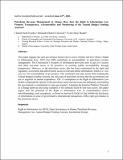Files in this item
Petroleum revenue management in Ghana : how does the right to information law promote transparency, accountability and monitoring of the annual budget funding amount?
Item metadata
| dc.contributor.author | Sefa-Nyarko, Clement | |
| dc.contributor.author | Okafor-Yarwood, Ifesinachi | |
| dc.contributor.author | Boadu, Evans Sakyi | |
| dc.date.accessioned | 2023-01-07T00:37:48Z | |
| dc.date.available | 2023-01-07T00:37:48Z | |
| dc.date.issued | 2021-09-01 | |
| dc.identifier | 275167927 | |
| dc.identifier | 2411729c-6d45-4c40-8f44-185820c2a563 | |
| dc.identifier | 85109427824 | |
| dc.identifier | 000680435200017 | |
| dc.identifier.citation | Sefa-Nyarko , C , Okafor-Yarwood , I & Boadu , E S 2021 , ' Petroleum revenue management in Ghana : how does the right to information law promote transparency, accountability and monitoring of the annual budget funding amount? ' , Extractive Industries and Society , vol. 8 , no. 3 , 100957 . https://doi.org/10.1016/j.exis.2021.100957 | en |
| dc.identifier.issn | 2214-790X | |
| dc.identifier.other | RIS: urn:ABE3821EDF452FCCE6E8F2FF0FE35753 | |
| dc.identifier.other | ORCID: /0000-0003-4952-9979/work/97473923 | |
| dc.identifier.uri | https://hdl.handle.net/10023/26708 | |
| dc.description.abstract | This paper engages the open governance framework to assess whether and how Ghana's Right to Information Law, 2019 (Act 989) contributes to accountability in petroleum revenue management. The Constitution's freedom of information provision aims to get civil society and other non-state actors to be proactive in exerting public accountability through transparency. However, in the petroleum sector, this has been constrained by the legal and regulatory ecosystems that affect timely access to relevant public information, which is a ‘sine qua non’ for accountability in governance. This constrains non-state actors from tracking the Annual Budget Funding Amount, the only part of petroleum revenue that the government can use to augment its annual expenditure. The 13 exemptions in the Right to Information Law further compound the opacity in the petroleum sector and showcase the ambiguity surrounding the government's commitment to open governance. Adopting the Kantian Publicity Principle as a change pathway and using examples of the setbacks faced by non-state actors, this paper argues that the potential of the Right to Information Law to counterbalance power notwithstanding, such exemptions, as found in Section 8(1)(d)(i-ii) that forbids the disclosure of information on some of government's international transactions, stifles open governance in the petroleum sector. | |
| dc.format.extent | 11 | |
| dc.format.extent | 686728 | |
| dc.language.iso | eng | |
| dc.relation.ispartof | Extractive Industries and Society | en |
| dc.subject | Annual budget funding amount | en |
| dc.subject | Institutional design | en |
| dc.subject | Open governance in Ghana | en |
| dc.subject | Petroleum revenue management act | en |
| dc.subject | Right to information act (RTI) | en |
| dc.subject | JS Local government Municipal government | en |
| dc.subject | T-NDAS | en |
| dc.subject | SDG 11 - Sustainable Cities and Communities | en |
| dc.subject | SDG 16 - Peace, Justice and Strong Institutions | en |
| dc.subject | AC | en |
| dc.subject | MCC | en |
| dc.subject.lcc | JS | en |
| dc.title | Petroleum revenue management in Ghana : how does the right to information law promote transparency, accountability and monitoring of the annual budget funding amount? | en |
| dc.type | Journal item | en |
| dc.contributor.institution | University of St Andrews. Geographies of Sustainability, Society, Inequalities and Possibilities | en |
| dc.contributor.institution | University of St Andrews. School of Geography & Sustainable Development | en |
| dc.identifier.doi | https://doi.org/10.1016/j.exis.2021.100957 | |
| dc.description.status | Peer reviewed | en |
| dc.date.embargoedUntil | 2023-01-07 |
This item appears in the following Collection(s)
Items in the St Andrews Research Repository are protected by copyright, with all rights reserved, unless otherwise indicated.

